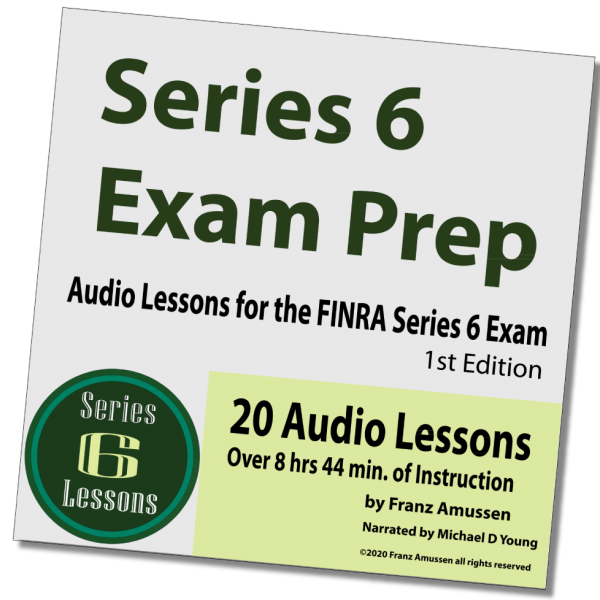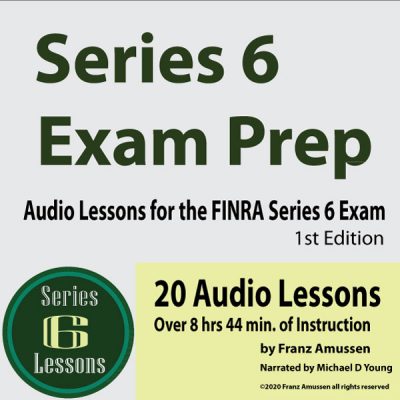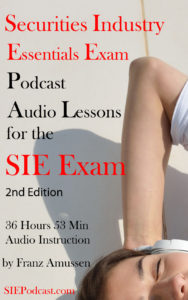Series 6 Lesson 2
This Series 6 lesson 2 covers
Types of Investments
Series 6 Lesson 2 delves into Bank deposits are backed by the FDIC, which the insurance from the federal government. This money is not at risk. The rewards/interest on this kind of investment are low.
Money that is invested with a broker-dealer is not backed by any government institution. The potential rewards/interest/dividends on these kinds of investments are potentially much higher.
Broker-dealers help clients invest in securities, such as stocks, bonds, and mutual funds. This kind of money is always at risk to some degree.
Opening an investment account is highly regulated by the federal government.
Company Books
The term “books” is used for records of financial transactions.
Originally, these books were physical records, but now, they are mostly electronic.
CPAs use accounting software to quickly generate reports, etc. These kinds of books are relatively simple.
Broker-dealers also have to keep books and they are much more complex.
Broker-Dealer Records
Things that have to be recorded: All client correspondence, all buy and sell orders, all deposits and withdrawals, etc.
These things are all stipulated under the Securities Exchange Act of 1934 and other FINRA rules.
All records have to be kept at least three years and sometimes up to six years.
Records much be made available to FINRA or SEC workers when they are performing an audit.
The records must be stored on a non-erasable, non-rewritable format, such as optical disks or magnetic tape/microfilm. Companies also need to provide means for an auditor to access and read all records, such as computers or film readers.
Records need to be labeled with the time and date.
Customer Accounts
FINRA requires that broker-dealers keep records about each customer, including the following information:
- Name
- Residence
- Name of Customer’s Representative, if applicable
- Signature of the principal
- Those with Power of Attorney if the Customer is a Business
- Signatures of those with Power of Discretion for Discretionary Accounts
- Taxpayer Identification Number (TIN), such as a Social Security Number
- Customer Occupation and Employer Address
- Customer FINRA Membership Status
- Eligibility Information (Financial Status, etc.)
Once you have obtained the customer’s information, you have to provide a copy of it to them so that they can verify that it is accurate.
Customers must be asked if the interest and dividend checks should be sent to him or her directly or to be credited to a specific account. Sometimes, people simply want their profits to be reinvested back into the mutual fund or stock in order to keep growing their investment until they are ready to cash out.
Customer information needs to be updated and verified on a regular basis to make sure that you are operating on the most current information. Many factors can change your decision makings, such as a change in finances, familial status, employment status, etc.
Broker-dealers make recommendations to customers, but they never invest or spend money without the customer’s approval. The customer must always provide written authorization before any transaction can be completed.
Once a year, each member receives a notice with the FINRA BrokerCheck hotline number and the FINRA website address, a statement that says that the customer can get a brochure explaining BrokerCheck.
BrokerCheck provides registration and disclosure information about broker-dealers, agents, and principals. If an agent has been suspended for any sort of misdeed, this will be recorded in BrokerCheck. Any written complaints from customers have to be acted upon and the all records of such correspondence and responses must be kept under FINRA rules.
Transferring Funds
Customers are allowed to transfer funds from one broker-dealer to another and both sides are required to expedite this process by using a system called ACATS (Automated Customer Account Transfer Service). Both sides need to quickly take care of these requests or promptly explain to the customer why the request cannot be granted. There are some assets that are not easily transferred, such as stock and bonds in a bankrupt company.
FINRA
FINRA is known as a Self-Regulatory Organization (SRO) that regulates firms, principals, and broker-dealers. FINRA is then regulated by the Securities and Exchange Commission (SEC) under the Securities Exchange Act of 1934. The SEC seeks to protect investors, maintain fair, orderly, and efficient markets and facilitate capital formation. Its three tenants include: full and fair disclosure, meticulous record keeping, and a fair and level marketplace.
Bank deposits are backed by the FDIC, which the insurance from the federal government. This money is not at risk. The rewards/interest on this kind of investment are low.
Money that is invested with a broker-dealer is not backed by any government institution. The potential rewards/interest/dividends on these kinds of investments are potentially much higher.
Broker-dealers help clients invest in securities, such as stocks, bonds, and mutual funds. This kind of money is always at risk to some degree.
Opening an investment account is highly regulated by the federal government.
Company Books
The term “books” is used for records of financial transactions.
Originally, these books were physical records, but now, they are mostly electronic.
CPAs use accounting software to quickly generate reports, etc. These kinds of books are relatively simple.
Broker-dealers also have to keep books and they are much more complex.
Broker-Dealer Records
Things that have to be recorded: All client correspondence, all buy and sell orders, all deposits and withdrawals, etc.
These things are all stipulated under the Securities Exchange Act of 1934 and other FINRA rules.
All records have to be kept at least three years and sometimes up to six years.
Records much be made available to FINRA or SEC workers when they are performing an audit.
The records must be stored on a non-erasable, non-rewritable format, such as optical disks or magnetic tape/microfilm. Companies also need to provide means for an auditor to access and read all records, such as computers or film readers.
Records need to be labeled with the time and date.
Customer Accounts
FINRA requires that broker-dealers keep records about each customer, including the following information:
- Name
- Residence
- Name of Customer’s Representative, if applicable
- Signature of the principal
- Those with Power of Attorney if the Customer is a Business
- Signatures of those with Power of Discretion for Discretionary Accounts
- Taxpayer Identification Number (TIN), such as a Social Security Number
- Customer Occupation and Employer Address
- Customer FINRA Membership Status
- Eligibility Information (Financial Status, etc.)
Once you have obtained the customer’s information, you have to provide a copy of it to them so that they can verify that it is accurate.
Customers must be asked if the interest and dividend checks should be sent to him or her directly or to be credited to a specific account. Sometimes, people simply want their profits to be reinvested back into the mutual fund or stock in order to keep growing their investment until they are ready to cash out.
Customer information needs to be updated and verified on a regular basis to make sure that you are operating on the most current information. Many factors can change your decision makings, such as a change in finances, familial status, employment status, etc.
Broker-dealers make recommendations to customers, but they never invest or spend money without the customer’s approval. The customer must always provide written authorization before any transaction can be completed.
Once a year, each member receives a notice with the FINRA BrokerCheck hotline number and the FINRA website address, a statement that says that the customer can get a brochure explaining BrokerCheck.
BrokerCheck provides registration and disclosure information about broker-dealers, agents, and principals. If an agent has been suspended for any sort of misdeed, this will be recorded in BrokerCheck. Any written complaints from customers have to be acted upon and the all records of such correspondence and responses must be kept under FINRA rules.
Transferring Funds
Customers are allowed to transfer funds from one broker-dealer to another and both sides are required to expedite this process by using a system called ACATS (Automated Customer Account Transfer Service). Both sides need to quickly take care of these requests or promptly explain to the customer why the request cannot be granted. There are some assets that are not easily transferred, such as stock and bonds in a bankrupt company.
FINRA
FINRA is known as a Self-Regulatory Organization (SRO) that regulates firms, principals, and broker-dealers. FINRA is then regulated by the Securities and Exchange Commission (SEC) under the Securities Exchange Act of 1934. The SEC seeks to protect investors, maintain fair, orderly, and efficient markets and facilitate capital formation. Its three tenants include: full and fair disclosure, meticulous record keeping, and a fair and level marketplace.
And more if you are studying for the Series 6 remember you also need to pass the SIE Exam and we have lessons to help you.
Series 6 Exam Prep
Audio Lessons for the FINRA Series 6 Exam
This series of audio lessons is designed to assist in the preparation to for the FINRA Series 6 Exam.
Passing the Series 6 exam is required for and individual who wishes to engage in the sale of Investment Company and Variable Contracts.
The Series 6 exam measures the degree to which each candidate possesses the knowledge needed to perform the critical functions of an investment company and variable contract products representative, including sales of mutual funds and variable annuities.
Candidates must pass both the Securities Industry Essentials (SIE) exam and the Series 6 exam to obtain the Investment Company and Variable Contracts Products registration.
Individuals passing these exams may be licensed to sell a limited set of securities products:
Mutual funds
Closed-end funds on the initial offering only
Unit investment trusts
Variable Annuities
This exam is administered by the Financial Industry Regulatory Authority (FINRA)
Table of Contents
Lesson 1: Exam Overview (25:24)
Lesson 2: Types of Investments, Broker-Dealer Records, Customer Accounts (27:46)
Lesson 3: Sales Blotter, Types of Account Ownership, Know Your Customer (26:20)
Lesson 4: Investment Vehicles, Measuring Yield, Options (25:35)
Lesson 5: Debt Securities (25:51)
Lesson 6: Investment Objectives (27:02)
Lesson 7: Time Horizon (25:25)
Lesson 8: Mutual Funds (25:20)
Lesson 9: Mutual Funds pt. 2 (26:38)
Lesson 10: Annuities (26:32)
Lesson 11: Investment Risk (27:13)
Lesson 12: Secondary Market (25:31)
Lesson 13: Code of Procedure (25:28)
Lesson 14: Series 6 designation, Security and Exchange Act of 1934 (25:23)
Lesson 15: Registration and Disclosure (25:38)
Lesson 16: Communications (26:07)
Lesson 17: FINRA Regulations (25:26)
Lesson 18: Review 1 (26:49)
Lesson 19: Review 2 (26:51)
Lesson 20: Review 3 (28:03)
Total Length 8 Hours 44 Min
Series 6 Exam Prep
Audio Lessons for the FINRA Series 6 Exam
This series of audio lessons is designed to assist in the preparation to for the FINRA Series 6 Exam.
Passing the Series 6 exam is required for and individual who wishes to engage in the sale of Investment Company and Variable Contracts.
The Series 6 exam measures the degree to which each candidate possesses the knowledge needed to perform the critical functions of an investment company and variable contract products representative, including sales of mutual funds and variable annuities.
Candidates must pass both the Securities Industry Essentials (SIE) exam and the Series 6 exam to obtain the Investment Company and Variable Contracts Products registration.
Individuals passing these exams may be licensed to sell a limited set of securities products:
Mutual funds
Closed-end funds on the initial offering only
Unit investment trusts
Variable Annuities
This exam is administered by the Financial Industry Regulatory Authority (FINRA)
Table of Contents
Lesson 1: Exam Overview (25:24)
Lesson 2: Types of Investments, Broker-Dealer Records, Customer Accounts (27:46)
Lesson 3: Sales Blotter, Types of Account Ownership, Know Your Customer (26:20)
Lesson 4: Investment Vehicles, Measuring Yield, Options (25:35)
Lesson 5: Debt Securities (25:51)
Lesson 6: Investment Objectives (27:02)
Lesson 7: Time Horizon (25:25)
Lesson 8: Mutual Funds (25:20)
Lesson 9: Mutual Funds pt. 2 (26:38)
Lesson 10: Annuities (26:32)
Lesson 11: Investment Risk (27:13)
Lesson 12: Secondary Market (25:31)
Lesson 13: Code of Procedure (25:28)
Lesson 14: Series 6 designation, Security and Exchange Act of 1934 (25:23)
Lesson 15: Registration and Disclosure (25:38)
Lesson 16: Communications (26:07)
Lesson 17: FINRA Regulations (25:26)
Lesson 18: Review 1 (26:49)
Lesson 19: Review 2 (26:51)
Lesson 20: Review 3 (28:03)
Total Length 8 Hours 44 Min
Podcast: Play in new window | Download (Duration: 10:50 — 4.5MB)
Subscribe: Apple Podcasts | RSS | Subscribe to Podcast




